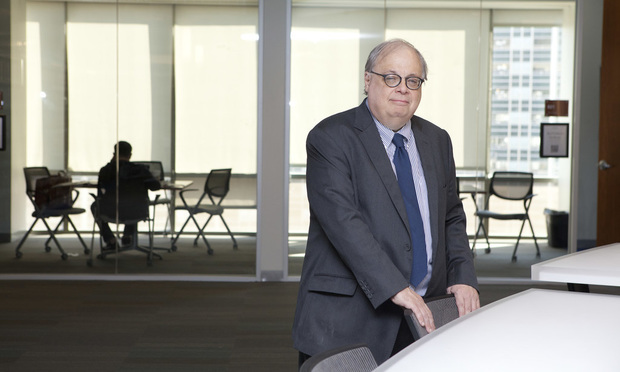Work Matters: 5 Ways for Lawyers to be Kinder to Themselves While There is Still Time
At the end of 2019, I read an article in The New York Times, "Eight Ways to Be Kinder to Yourself in 2020," by Tim Herrera. Hmm, kinder to yourself?…
January 20, 2020 at 08:14 PM
6 minute read
 Michael P. Maslanka, assistant professor of law, UNT Dallas College of Law. Photo: Danny Hurley
Michael P. Maslanka, assistant professor of law, UNT Dallas College of Law. Photo: Danny Hurley
At the end of 2019, I read an article in The New York Times, "Eight Ways to Be Kinder to Yourself in 2020," by Tim Herrera. Hmm, kinder to yourself? Now, there's a revolutionary idea, especially for lawyers. It reminds me of a favorite lawyer movie, "Defending Your Life," written by and starring the inestimable Albert Brooks. He's a yuppie (remember them?) killed in a head-on bus collision while driving home from a car dealership in his new BMW. He ascends to "Judgment City," is appointed a public defender and told by the PD his life will be reviewed by a panel of three judges who will decide if he gets promoted to the next level of existence (if not, he gets tossed back into the maw of the universe). An astonished Brooks asks essentially whether he is going on trial. A nonplussed PD remakes, "first of all we don't like to call it a trial, and second of all yes."
The hinge-point of the movie follows with Brooks pleading that he was a nice person while alive and should therefore move on. Exhibit 1: he gave money to the homeless; sure he doesn't have any receipts but he implores, "You don't get receipts" for that sort of stuff. A somber PD replies that he knows that Brooks was a nice person but that he wishes there was one person he would have been nicer to. Astonished Brooks asks "who, who?" The PD replies: "yourself." So here are five ways for lawyers to be kinder to themselves, while there is still time.
No 1: When it's over, it's over
When you get an adverse ruling and feel worse than the client, stop and re-orient yourself. This means you are too close to the matter. As professor David Crump of the University of Houston Law Center astutely points out, a good lawyer's personal commitment to a client works against the lawyer when the lawyer loses. A commitment to excellence morphs what should be an impersonal defeat into an all too personal rejection. Like mourning death, lawyers should work through the grieving process, prying themselves lose from the stages of denial and anger and instead adhering themselves to the stages of learning and acceptance. A way to help do so is performing an "After Action Report," just as in the military, on what you learned from the past and how you will apply those lessons to the future. As Austin based writer Austin Kleon, in his new book, "Keep Going: 10 Ways to Stay Creative in Good Times and Bad," say, "When the sun goes down and you look back on the day, go easy on yourself. A little self-forgiveness goes a long way. Before you go to bed, make a list of what you want to get done tomorrow. … A day that seems like a waster now might turn out to have a purpose or use or beauty to it later on."
No. 2: Let's Just Be Friends
In his book "Law v. Life," lawyer Walt Bachman writes that many disciplinary matters stem from a lawyer's well-meaning belief that when a prospective client is in trouble the lawyer must come to their aid. I have students in professional responsibility write in a weekly journal and one assignment is to pick the three mistakes (out of a list of the 10 most common) they will most likely make in practice. Invariably, year after year, it is that they will let their emotions override their judgment and represent a person they knew they should not have (this is an exercise from professor Barbara Glesner Fines in "Professional Responsibility: A Context and Practice Casebook"). To return to Bachman, lawyers are not a public utility and in forgetting that lesson we contract "L.A.S.: Lawyer Avoidance Syndrome," and end up neglecting work for a client we really should not have taken on in the first place. The pain is avoidable.
No. 3: Play Small Ball
Lawyers are inbred with the desire to aspire: to hit homers, to sink the hole in one, to drain three pointers from beyond the paint. My advice: aspire elsewhere. Seek motivation through incremental wins, not huge ones. With the second, there is always a lot of talk but never any action. Saying "I will write a book" is fun to say, daunting to do. But saying "I will write an outline for chapter one is achievable." And once you achieve it, you are then primed automatically to do more. The incremental accomplishment fuels other accomplishments. Want to learn more? Read "The Motivation Myth: How High Achievers Get the Motivation to Win," from Jeff Hayden.
No. 4: You can't change anything, you can only deal with everything
The dysfunctional populate our lives. Other lawyers refusing to play by the rules; making practice needlessly aggravating; imparting, as the expression goes, heat but no light. Clients or judges or chance and circumstance often do likewise. The Stoics taught us that we have 0 percent power to change our circumstances but 100 percent power in determining our reaction to those circumstances; an excellent book on this concept is Viktor Frankl's "Man's Search for Meaning." So, only invest your precious time and your limited emotional energy in your reaction to your circumstances.
No. 5: Be yourself, everyone else is taken
That's Oscar Wilde. Yet we reject the counsel, insisting that we compare ourselves to others. Some advice: change mindsets. When I was a kid, I was watching golfer Tom Watson at a golf tournament press conference. He was asked how he held it together on the course. After all, consider the pressure: applause from other greens and the Leader Board towering above the course and men in sports coats whispering commentary to the TV audience. His reply is the ultimate antidote to pointless comparison, "When I am out on the course, it is me versus the course. Period."
Riddle me this Batman: why is it often easier for lawyers to be unduly critical of themselves rather than kind to themselves? I think because, as Type A personalities, we delude ourselves into believing we deserve the first but not the second. This belief is unfair to ourselves but more importantly unfair to someone more important than us — our clients. Lack of kindness to ourselves — whether from unrealistic expectations, poor decision making, relentless self-attack — wreaks havoc on our ability to serve clients. So, be kind to yourselves. You and others can only benefit.
Michael P. Maslanka is an assistant professor of law at UNT Dallas College of Law. His e-mail is [email protected].
This content has been archived. It is available through our partners, LexisNexis® and Bloomberg Law.
To view this content, please continue to their sites.
Not a Lexis Subscriber?
Subscribe Now
Not a Bloomberg Law Subscriber?
Subscribe Now
NOT FOR REPRINT
© 2025 ALM Global, LLC, All Rights Reserved. Request academic re-use from www.copyright.com. All other uses, submit a request to [email protected]. For more information visit Asset & Logo Licensing.
You Might Like
View All
From Hospital Bed to Legal Insights: Lessons in Life, Law, and Lawyering
6 minute read

Nondisparagement Clauses in Divorce: Balancing Family Harmony and Free Speech
6 minute readTrending Stories
- 1Trade Wars: Five Tips for Legal Teams to Manage Tariffs and Trade in Trump II
- 2Balancing Attorney-Client Privilege With a Lawyer’s Right to Defend Against Allegations of Wrongdoing
- 3Public Interest Calendar of Events
- 4Sharpening Residential Insurance Fraud Defense Strategies: Insights for Insurers to Mitigate Risk in 2025
- 5Reversal of Fortune: Restoring Owners’ Equity Under New Jersey’s Tax Sale Law
Who Got The Work
J. Brugh Lower of Gibbons has entered an appearance for industrial equipment supplier Devco Corporation in a pending trademark infringement lawsuit. The suit, accusing the defendant of selling knock-off Graco products, was filed Dec. 18 in New Jersey District Court by Rivkin Radler on behalf of Graco Inc. and Graco Minnesota. The case, assigned to U.S. District Judge Zahid N. Quraishi, is 3:24-cv-11294, Graco Inc. et al v. Devco Corporation.
Who Got The Work
Rebecca Maller-Stein and Kent A. Yalowitz of Arnold & Porter Kaye Scholer have entered their appearances for Hanaco Venture Capital and its executives, Lior Prosor and David Frankel, in a pending securities lawsuit. The action, filed on Dec. 24 in New York Southern District Court by Zell, Aron & Co. on behalf of Goldeneye Advisors, accuses the defendants of negligently and fraudulently managing the plaintiff's $1 million investment. The case, assigned to U.S. District Judge Vernon S. Broderick, is 1:24-cv-09918, Goldeneye Advisors, LLC v. Hanaco Venture Capital, Ltd. et al.
Who Got The Work
Attorneys from A&O Shearman has stepped in as defense counsel for Toronto-Dominion Bank and other defendants in a pending securities class action. The suit, filed Dec. 11 in New York Southern District Court by Bleichmar Fonti & Auld, accuses the defendants of concealing the bank's 'pervasive' deficiencies in regards to its compliance with the Bank Secrecy Act and the quality of its anti-money laundering controls. The case, assigned to U.S. District Judge Arun Subramanian, is 1:24-cv-09445, Gonzalez v. The Toronto-Dominion Bank et al.
Who Got The Work
Crown Castle International, a Pennsylvania company providing shared communications infrastructure, has turned to Luke D. Wolf of Gordon Rees Scully Mansukhani to fend off a pending breach-of-contract lawsuit. The court action, filed Nov. 25 in Michigan Eastern District Court by Hooper Hathaway PC on behalf of The Town Residences LLC, accuses Crown Castle of failing to transfer approximately $30,000 in utility payments from T-Mobile in breach of a roof-top lease and assignment agreement. The case, assigned to U.S. District Judge Susan K. Declercq, is 2:24-cv-13131, The Town Residences LLC v. T-Mobile US, Inc. et al.
Who Got The Work
Wilfred P. Coronato and Daniel M. Schwartz of McCarter & English have stepped in as defense counsel to Electrolux Home Products Inc. in a pending product liability lawsuit. The court action, filed Nov. 26 in New York Eastern District Court by Poulos Lopiccolo PC and Nagel Rice LLP on behalf of David Stern, alleges that the defendant's refrigerators’ drawers and shelving repeatedly break and fall apart within months after purchase. The case, assigned to U.S. District Judge Joan M. Azrack, is 2:24-cv-08204, Stern v. Electrolux Home Products, Inc.
Featured Firms
Law Offices of Gary Martin Hays & Associates, P.C.
(470) 294-1674
Law Offices of Mark E. Salomone
(857) 444-6468
Smith & Hassler
(713) 739-1250







